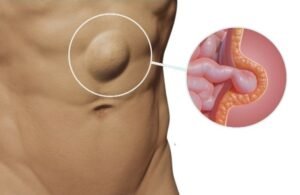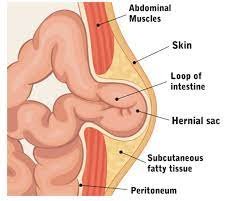What is Hernia in Men – Your medical provider can give guidance on what is best for your situation. This information does not constitute medical advice or diagnosis. A hernia is a sac that forms when the lining of the abdominal cavity (peritoneum) pushes through a weak area in the belly wall. Hernias usually occur in the abdomen or groin.
Hernias can form when pressure is applied to an organ or the intestines in the same area as weakened muscle or tissue. Some people are born with weak muscles or tissue, but most people get hernias as they age and their muscles weaken.
Hernias typically result from a combination of muscle weakness and strain. They won’t heal on their own, but if your hernia does not bother you, you can likely wait to have surgery. Over time, hernias tend to get bigger as the muscle wall of the belly gets weaker and more tissue bulges through.

In general, a hernia starts with pressure on an organ or your intestines. A hernia forms when this pressure happens in the same area as a weakened muscle or tissue. Some people are born with weak muscles or tissue that isn’t fully developed. However, most people get hernias as their bodies age and their muscles weaken.
If you aren’t able to push the hernia in, the contents of the hernia may be trapped (incarcerated) in the abdominal wall. An incarcerated hernia can become strangulated, which cuts off the blood flow to the tissue that’s trapped. A strangulated hernia can be life-threatening if it isn’t treated.
Learn more about Tips for Skin Care in Summer
What is the main cause of hernia?
In general, a hernia starts with pressure on an organ or your intestines. A hernia forms when this pressure happens in the same area as a weakened muscle or tissue. Some people are born with weak muscles or tissue that isn’t fully developed. However, most people get hernias as their bodies age and their muscles weaken.
What hernia mean?
A hernia is a sac formed by the lining of the abdominal cavity (peritoneum). The sac comes through a hole or weak area in the strong layer of the belly wall that surrounds the muscle.

Can a hernia be removed?
Hernias cannot be fixed with medications. Most require surgery (herniorrhaphy). During hernia repair surgery, a surgeon: Pushes the bulging tissue back into place.
What age is a hernia?
Inguinal hernias are more common in certain age groups. Among adults, the chance of having an inguinal hernia increases with age, and inguinal hernias are most common in people ages of 75 to 80. Among children, inguinal hernias are most common in those between the ages of 0 and 5 years.
Learn more about Ayurvedic Health Tips
Do hernias cause gas?
A hernia can cause gas and bloating by changing the arrangement and shape of the organs in your abdomen. This can trap gas in your gastrointestinal (GI) tract and increase gas pressure in your GI tract to uncomfortable levels. Types of hernias that can cause gas and bloating include abdominal hernia.
Where is a male hernia located?
Inguinal hernias occur in the inguinal canal, which is a passageway that runs down either side of your pelvis into your sex organs. They’re also called groin hernias. (“Inguinal” means “in the groin.”) They’re the most common type of groin hernia, though not the only type.
How can I check my hernia?
Your doctor will check for a bulge in the groin area. Because standing and coughing can make a hernia more prominent, you’ll likely be asked to stand and cough or strain. If the diagnosis isn’t readily apparent, your doctor might order an imaging test, such as an abdominal ultrasound, CT scan or MRI.
Are hernias painful?
You may not feel it at all, or you may feel pressure, a dull ache or a sharp pain when the hernia comes through the opening. If you have frequent discomfort, you should see a healthcare provider right away. A hiatal hernia, in particular, may cause chronic acid reflux. You may feel it as heartburn or indigestion.
Learn more about Benefits of Pineapple for Men
Can I live with a hernia?
Not all hernias need surgery. In fact, it may be safe to live with certain types. However, some hernias can cause certain emergencies and intestinal damage, which is why you should consult with a surgeon.

Can hernias affect periods?
Inguinal hernia pain is usually felt at or above the groin and may radiate to the hip, lower back, vulva, or thigh. Many women find hernia pain increases during their period. Hernia pain can also be exacerbated by any activity that puts extra pressure on the pelvic floor, such as Bending.
What size hernia needs surgery?
There is no set size when surgery is required for a hiatal hernia. The decision to operate is based on a number of factors, including the severity of symptoms, the presence of other medical conditions, and the preference of the patient.
Can you feel a hernia?
Symptoms of an abdominal or groin hernia may include A bulge or lump you can see or feel in the abdomen or groin. Bulge that is more noticeable or uncomfortable at the end of a long day, when you have been on your feet. Aching pain or a feeling of pressure in the area.
Can a 21 year old get a hernia?
Most people in their 20s or younger who have a hernia have an indirect inguinal hernia. If you’re a man and your doctor finds that the hernia has extended into your scrotum, the diagnosis is usually an indirect hernia. A direct hernia doesn’t follow that path through the inguinal ring into the scrotum.
Can a 20 year old get a hernia?
Anyone can develop a hernia. It’s thought that a combination of weak muscles and straining, such as when lifting a heavy object, may contribute to their development. “Risk factors for a hernia also include increasing age, male sex, smoking, and a chronic cough and/or constipation,” Bildzukewicz adds.
Is hernia caused by stress?
Emotional stress can’t cause a hernia, but emotional stress is related to hernias in other ways. Finding a lump on your body can cause you to worry that it’s something else, like a tumor. The pain from your hernia can get in the way of your daily life and physical activities, which can cause emotional stress.
How can I reduce my hernia?
Apply ice or cold compress to the hernia for several minutes to reduce swelling and allow an easier reduction (see the image below). Ice pack is applied to patient with left inguinal hernia in Trendelenburg position. To reduce an abdominal hernia, lay the patient supine.
Is hernia a serious problem?
If you aren’t able to push the hernia in, the contents of the hernia may be trapped (incarcerated) in the abdominal wall. An incarcerated hernia can become strangulated, which cuts off the blood flow to the tissue that’s trapped. A strangulated hernia can be life-threatening if it isn’t treated.
Learn more about Bridal Skin Care Tips
What are the 5 warning signs of hernia?
Symptoms in Men
- A bulge you can see or feel.
- Aching pain in the area.
- A feeling of pressure.
- A tugging sensation of the scrotum around the testicles.
- Pain that worsens with activities that add pressure to the area, such as heavy lifting, pushing, and straining.
Gilmore’s Groin & Hernia Clinic FAQ
How soon can I have an appointment?
We have a specialist consultant available every weekday, so it can usually be within 24 hours of requesting your appointment. In some cases, you may be able to have your appointment scheduled for the same day. This of course depends on availability.
If you wish to see a specific consultant, please mention their name when booking. This, however, may lead to a small delay in your initial appointment.
How much does it cost?
The costs range from £250 for initial consultation to £350 for a second opinion and £180 to £225 for follow-up consultations. There are additional charges for any investigations or diagnostic tests.
What happens next?
After your consultant has made their diagnosis and if surgery is required, they will discuss this with you. With your consent our team will help schedule this in within a week of the decision being made, however, in some cases, it can be quicker.
If surgery is not required, your consultant will explain to you any follow-up treatment that may be required.
Learn more about Teen Skin Care Tips
FAQ’s What is Hernia in Men
Where will my surgery take place?
Your groin and hernia surgery will be carried out by your Consultant Surgeon at The Weymouth Street Hospital, 42-46 Weymouth Street, London W1G 6NP
What can I expect on the day of my surgery?
Your consultant and the hospital team will go over any concerns you may have prior surgery and assist you through your entire procedure.
When can I remove my wound dressing?
We will help arrange an appointment post-surgery with your consultant to remove your wound dressing. We advise you to not change or disturb the dressing till them.
Do I need to come back to remove my stitches?
Your stitches are dissolvable and do not need to be removed.
What do I do if I notice changes in my wound?
Although wound infection is rare, you should still be aware of any changes to the wound site and surrounding areas.
Can I take a shower post my operation?
It’s quite safe to take a shower on the following day as the dressing covering your wound is mostly, although soaking your wound in a bath, or swimming, is not recommended for 2 weeks.
